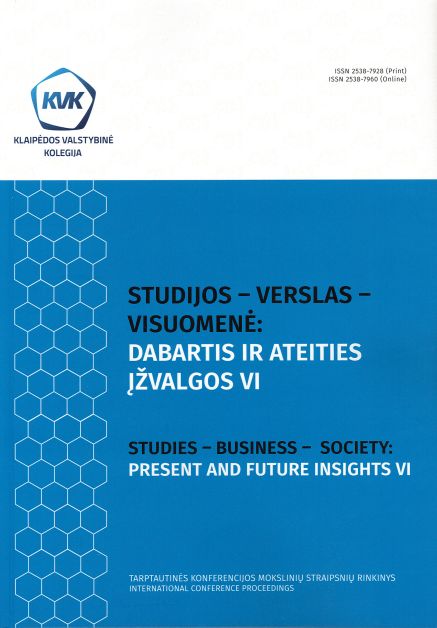TĖVŲ, AUGINANČIŲ IKIMOKYKLINIO AMŽIAUS SPECIALIŲJŲ UGDYMOSI POREIKIŲ VAIKUS, PEDAGOGINIS ŠVIETIMAS SIEKIANT PARTNERYSTĖS SU MOKYTOJAIS
DOI:
https://doi.org/10.52320/svv.viVI.193Reikšminiai žodžiai:
specialiųjų ugdymosi poreikių vaikai, šeima, pedagoginis tėvų švietimas, partnerystėSantrauka
Straipsnyje teoriškai ir praktiškai pagrindžiamas tėvų, auginančių ikimokyklinio amžiaus specialiųjų ugdymosi poreikių vaikus, pedagoginis švietimas bei jo aktualumas, siekiant partnerystės su mokytojais. Tėvų ir mokytojų bendradarbiavimas, grįstas abipuse partneryste yra reikalingas ir reikšmingas vaikui su specialiaisiais ugdymosi poreikiais, kuris aprėpia suinteresuotus ugdymo dalyvius, galinčius nulemti ugdymo proceso sėkmingumą. Partnerystė – ugdymo dalyviai (tėvai, mokytojai, švietimo pagalbos specialistai ir kt.) yra atviri vieni kitiems, geranoriškai derina savo požiūrius į vaiko ugdymą, tariasi dėl ugdymo tikslų, turinio, vaiko poreikių tenkinimo būdų. Geras bendravimas ir tarpusavio ryšys yra esminis tikros partnerystės bruožas.Tyrimo rezultatai atskleidžia, jog tėvų, auginančių ikimokyklinio amžiaus specialiųjų ugdymosi poreikių vaiką, požiūriu, poreikis pedagoginiam švietimui siekiant partnerystės yra aktualus, tačiau labai dažnai jis suprantamas kaip tradicinis jų informavimas apie vaiko ugdymą, o ne bendrų veiklų organizavimas, grįstas dialogiškumu ir refleksija. Labai dažnai vyrauja tradicinės tėvų informavimo formos: bendri susirinkimai, individualūs pokalbiai su grupės pedagogu, informacija pateikiama stenduose.Visiems tėvams priimtiniausios pedagoginio švietimo formos yra individualūs pokalbiai su švietimo pagalbos specialistais ir jų konsultacijos.Tyrimas atskleidė, jog ikimokyklinio ugdymo įstaigoje vyksta nuolatinė tėvų komunikacija su pedagogais, tačiau jiems dar labai trūksta nuoseklesnės informacijos apie vaiko pasiekimus, vaiko savijautą, reikalingi praktiniai patarimai. Dažiausiai taikomos pedagoginio švietimo formos – individualūs pokalbiai, konsultacijos, kurios padeda suprasti vaiko raidos, ugdymo sunkumus. Poreikis bendradarbiauti, kuris būtų paremtas partneryste yra didžiulis, tačiau tėvai pageidautų iš pedagogų daugiau iniciatyvos.Tik intensyvus bendradarbiavimas ir partnerystė su tėvais gali užtikrinti kokybišką specialiųjų ugdymosi poreikių vaikų ugdymą.
Atsisiuntimai
Publikuota
Numeris
Skyrius
Licencija

Atskiri straipsniai yra skelbiami „Open Access“ pagal „Creative Commons“ licenciją CC-BY 4.0, leidžiančią neribotai naudoti, platinti ir atgaminti betkokioje laikmenoje, su sąlyga, kad nurodytas originalus autorius ir šaltinis. Autoriai išlaiko autorių teises į savo straipsnius, tačiau suteikia Klaipėdos valstybinei kolegijai pirmojo leidinio teisę.

